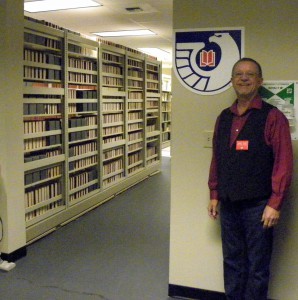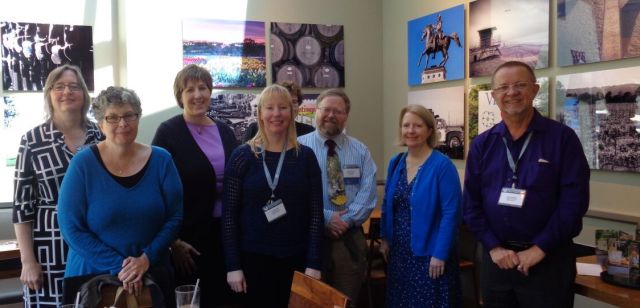 You have no doubt heard that Rand Simmons has moved to a new position in the State Library. His new role is “Federal Collection Executive Manager” a job title certainly, but not really a job description. So this intrepid reporter decided to dig a little deeper and learn just what exciting things are unfolding with this new State Library initiative. Wow, Rand has his work cut out.
You have no doubt heard that Rand Simmons has moved to a new position in the State Library. His new role is “Federal Collection Executive Manager” a job title certainly, but not really a job description. So this intrepid reporter decided to dig a little deeper and learn just what exciting things are unfolding with this new State Library initiative. Wow, Rand has his work cut out.
A little background. The Washington State Library (WSL) is the Federal Regional Depository Library for Washington and Alaska. This means we are obliged to collect and maintain ALL the federal documents distributed through the Federal Depository Library Program and allow all the libraries and citizens within our region to access them.
What is a federal document you ask? A working definition might be “a publication of a federal agency, congress, or the courts.” Guess what, after years of collecting, even though many of the federal documents are housed off site, we are running out of space at the State Library.
In addition to WSL’s collection there are 25 Selective Depositories scattered around these two states, which house smaller collections chosen specifically for their users. Some of the libraries also house pieces of the regional collection on behalf of the State Library. Rand is working with the selective depositories, using a model developed at the Oregon State Library, to have them take increased responsibility for parts of the regional collection. The regional collection would be distributed among at least five selective depository libraries and the State Library. “This is a model we have wanted to put into place for at least five years,” Crystal Lentz, Regional Federal Depository Library Coordinator, observed.
To give an example of how the Shared Regional Collection would work, WSU has offered to be responsible for documents about Agriculture. The WSL, as the regional depository, must comply with certain regulations regarding the regional collection and when libraries like WSU partner with us, they will agree to comply with the same regulations. The regulations will mean less flexibility for the libraries to discard items from within their federal collection. Regional collection items generally cannot be discarded, except under very specific circumstances, while items received as part of a selective depository collection can be discarded after 5 years. As you can imagine this will be a slow process with many moving parts and many individuals involved but it is really a key for all of these libraries, including WSL, to have a well-managed, comprehensive federal documents collection for the people of Washington and Alaska. Rand and Crystal are working together with these libraries to develop housing agreements (contracts) that will identify the expectations and obligations to which all parties will comply.
Another piece of Rand’s job is to work towards providing online public access to all federal documents through digitization. This is a complex project. While some of the State Library’s federal collection is cataloged many older documents are not. Crystal noted that “many depository libraries are in the same situation of not knowing how many federal publications they have. Even the Government Publishing Office cannot tell us what is included in a comprehensive collection. We have well over a million items. How much more is the mystery.”
Rand describes the project as having two major steps: 1) inventory and catalog pieces of the collection that have been selected for digitization and 2) digitize publications that cannot be accessed online. Two simple steps that equal a rather daunting project.
First we have to determine exactly what we have/don’t have. Because the Washington State Library was created as a federal territorial library we have been collecting federal publications for a long time. Documents are received in print (paper), on microfiche or other mediums such as DVD, and electronically.
Inventory, cataloging and digitization are parts of making the regional collection visible and available to our “virtual” customers – those who want and need these publications but who are not able to be walk-in customers or able to borrow items through interlibrary loan. The project is labor intensive and will require resources not currently available including a larger staff. Rand stated, “We don’t want to catalog and digitize publications that other libraries have done.” Unfortunately there is no single place to search to learn which documents have already been digitized by other institutions.
You get the picture. Before we can even begin the digitization of the documents there is a lot of leg work to be done. Despite hurdles to be jumped Secretary Wyman has stressed the importance of making our federal publications more available to a wider audience than they are now. The Secretary of State’s office has the goal to become a national leader in the digitization of the Federal Documents collection. The key is digitizing these publication so they are available to people through the Internet. While the process will take time it has now become a priority for our leadership and we look forward to seeing the project unfold.










